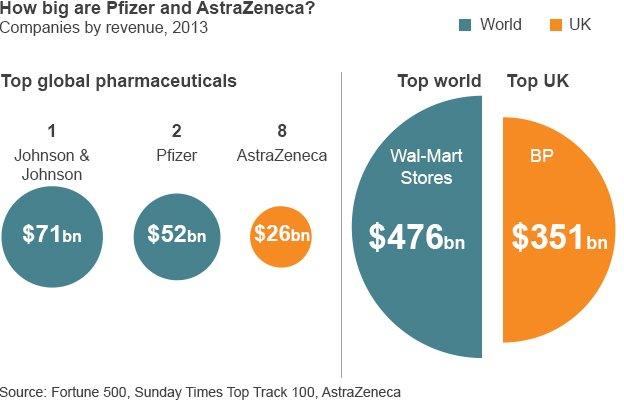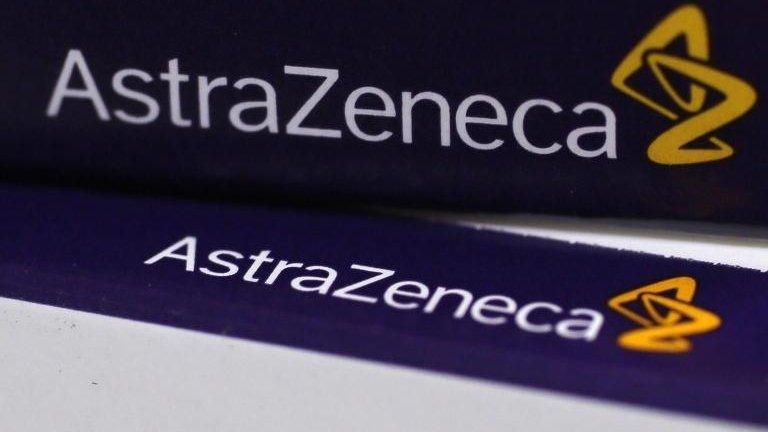Cameron and Miliband clash over Pfizer deal
- Published
PMQs: David Cameron and Ed Miliband on the Pfizer bid for AstraZeneca
David Cameron and Ed Miliband have clashed at Prime Minister's Questions over the proposed takeover of AstraZeneca by its US rival Pfizer.
The Labour leader challenged the prime minister to intervene in the proposed deal.
He said if Mr Cameron did not "everyone will know he was acting as a cheerleader" for the deal.
Mr Cameron said the government would "back British jobs, British research and development and British science".
Referring to the Kraft takeover of Cadbury's under the last Labour government, Mr Cameron said ministers were actively engaging with both Pfizer and AstraZeneca, "because we know what happens when you stand back, just say you're opposed to everything - what you get is abject surrender and no guarantees for Britain".
Mr Miliband said Labour would back the government if it chose to widen the public interest test to include science and research and development (R&D).
He asked Mr Cameron: "Is he ruling out or ruling in the public interest test on this matter? We could make it happen. If he does not do it now everyone will know he was a cheerleader for the deal."
"I think it's deeply sad that he makes accusations about cheerleading when the government was getting stuck in protecting British jobs," the Prime Minister responded.
"They wrote the rules. They sold the gold, they saw manufacturing in our country decline by one half and we will never take lectures from the people who wrecked our economy."

The current public interest powers available to ministers allow them to intervene in takeover deals and mergers in a limited number of instances.
These include national security concerns, media company mergers and banks.
They do not give the government scope to address concerns about jobs or investment in research and development raised by the potential Pfizer takeover.
Tax
Earlier, Swedish finance minister Anders Borg told BBC Radio 4's Today programme that his country's experience of pledges from Pfizer had led him to be sceptical of the US firm.
"Our experience shows that their track record is not very convincing and I think one should take these kind of promises not only with a pinch of salt but a sack full of salt," he said.
"They are giving short-term commitments, but in the long term I think they are heavily orientated toward profitability, and not profitability through new research but profitability from cost cutting."
Mr Borg added: "I'm more worried that the Pfizer bid for AstraZeneca is much more driven by tax concerns.
"And we know when you see mergers and acquisitions you see a lot of failures and those that have been driven by tax logic, rather than business logic, tend to be even worse."
"So I think the proof here is really on Pfizer they must really show that this is really good for Swedish and British society.
"Society is investing heavily in life sciences. Therefore I think there is an obligation on Pfizer to show that they are ready to develop this," Mr Borg said.
Probe
Pfizer offered £63bn for the UK pharmaceutical giant on Friday.
If the deal were to go ahead, it would be the biggest takeover in UK corporate history.
The offer - the second Pfizer has made for AstraZeneca - was immediately rejected by the board of the UK pharmaceutical firm, which said Pfizer continued to "significantly undervalue" the company.
MPs are preparing to investigate the proposed takeover deal.
Two parliamentary select committees - the Business Select Committee and the Science and Technology committee - have said they intend to summon the bosses of both companies to answer questions.
AstraZeneca employs more than 51,000 staff worldwide, with 6,700 in the UK. Pfizer has a global workforce of more than 70,000, with 2,500 in the UK.
- Published6 May 2014

- Published4 May 2014

- Published2 May 2014
